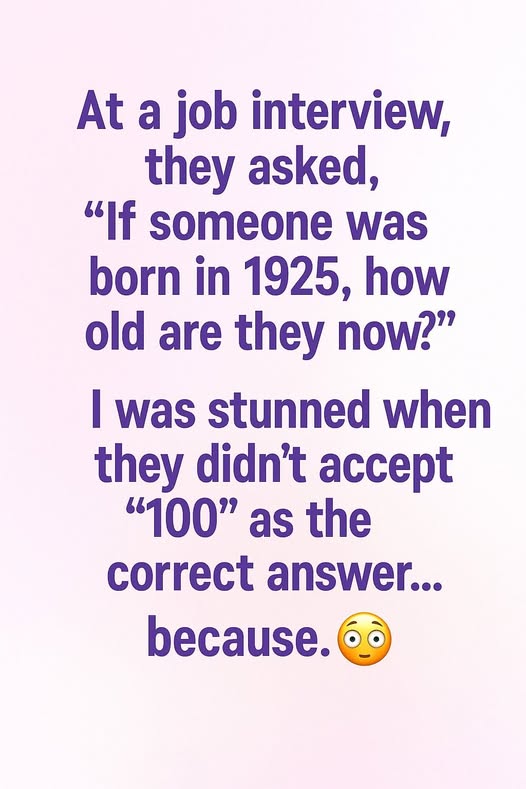At a recent job interview, I was asked a question that seemed straightforward at first: “If someone was born in 1925, how old are they now?” I paused, thinking it was a simple arithmetic problem. Instantly, my mind went to the basic calculation — subtracting 1925 from the current year. My answer came quickly and confidently: “100.”
But to my surprise, the interviewer didn’t accept it. Instead, they smiled gently and said something that made me pause:
“They might not be alive anymore—but the real question is: how would you find the right answer if they were?”
In that moment, I realized this wasn’t a test of my math skills. It was something deeper. They weren’t checking whether I could subtract numbers correctly; they were assessing my mindset, my approach to problems, and my ability to think critically instead of jumping to conclusions.
They were looking for someone who would ask the right questions before giving an answer. Questions like: “Is the person still alive?” “When exactly is their birthday?” “What’s the current year?” They wanted to see whether I would make assumptions or take the time to verify the facts first.
My instinct had been to answer quickly, believing that speed and confidence were the same as competence. I had thought, “This is simple; a quick answer shows I know my stuff.” But that approach missed the point entirely. The interviewer was teaching me something important: sometimes, being right isn’t about answering first; it’s about answering thoughtfully, with curiosity, care, and a willingness to dig a little deeper.
The interviewer continued, explaining why this question mattered: “In our work, assumptions can lead to serious mistakes. We value curiosity, not just confidence. We want people who ask questions, investigate, and think critically before drawing conclusions.”
Hearing this, I felt a strange mix of embarrassment and enlightenment. I had been corrected in front of strangers, but it didn’t feel like failure. Instead, it felt like growth. That seemingly simple question about age had become a lesson about life: accuracy, insight, and wisdom often require patience, humility, and a readiness to look beyond the obvious.
Walking out of the interview, I reflected on what I had learned. I realized that being teachable — being willing to pause, consider, and adjust — is more valuable than being perfect. Mistakes aren’t always failures; they can be opportunities to learn, to refine your thinking, and to approach challenges with a deeper understanding.
A week later, I received a call from the company. I got the job. They told me that what impressed them wasn’t that I had initially miscalculated, but how I responded after realizing my mistake — how I adapted, thought carefully, and remained open to correction. That feedback drove the lesson home even further: humility, reflection, and curiosity can leave a far greater impact than simply getting an answer right the first time.
From that day forward, I carried this lesson with me. I learned to slow down, ask better questions, and recognize that every problem is not just about the answer — it’s about the process, the reasoning, and the willingness to explore possibilities before concluding. That small interview question became a profound reminder that life often rewards those who approach it with thoughtful inquiry, patience, and an open mind.
